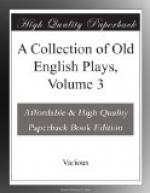THE DISTRACTED EMPEROR.
A TRAGI-COMEDY.
Printed for the first time from Egerton MS. 1994.
The Distracted Emperor.
Actus Primus.
Enter La Busse and Didier.
Bus. Thou looke for dygnitie! yes, thou mayst looke, But pray thee, fellowe, see thyne eies be good Or thou mayst looke and never fynde the way.
Did. Howe can myne eies fayle when so fayre a marke As honor lyes before me?
Bus. Thou sayst well;
The thought of honor is a perfect greene,
And greene is good for th’eie syghte. Syllie
man,
Arte growne fantastycke in thy latter days?
Trust me, I thought thou rather couldst have wisht
To feele thyne eies bournt out into their socketts
Then thus to live and see the blacke disgrace
That will approatche, and soone, if thou darest live.
And yet you looke for dygnitie! oh madnes!
What, haveinge fyrst beene cheated of thy wealthe,
Darest thou againe be cheated of thy witt,—
And thynke so poor a lord as is my father,
The most dyspysd forsaken Ganelon,
Can propp thy mynde,[82] fortune’s shame upon
thee!
Wayte with a trencher, goe learne policye;
A servingman at dynner tyme will teach thee
To give attendance on the full-fedd gueste,
Not on the hungry sharke; and yet you thynke
To feede on larke by serving my poore father!
Did. Nothing but larke, La Busse? Yes, mightie surloyns.
Bus. Your lorde and master would be gladd
of halfe.
Pyttied companion, spare thy feeble eies,
Looke not for honor least thou loose thy syghte.
Such followers as thou, that would repayre
A broken state by service, may be lyckned
To shypwrackt marchants that will rather seeke
To catche a rotten board or to be cast
Uppon some frozen Ile then perish quycklie.
But thou perhapps seekst voluntary pennance,
Meaninge to perishe in a frozen clyme
Because thou hast abused thy former blessings;
Thy gameinge humor hath beene like a fyer.




